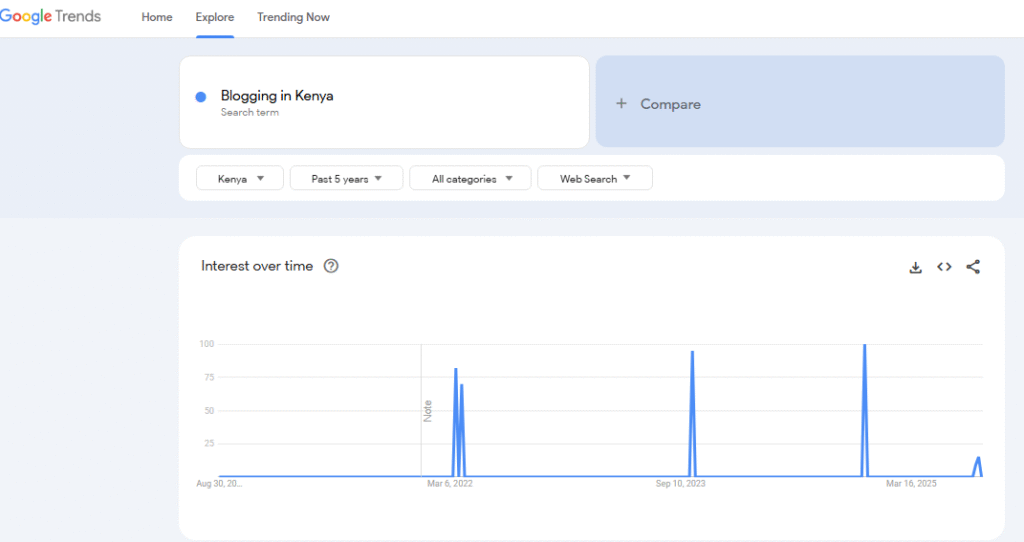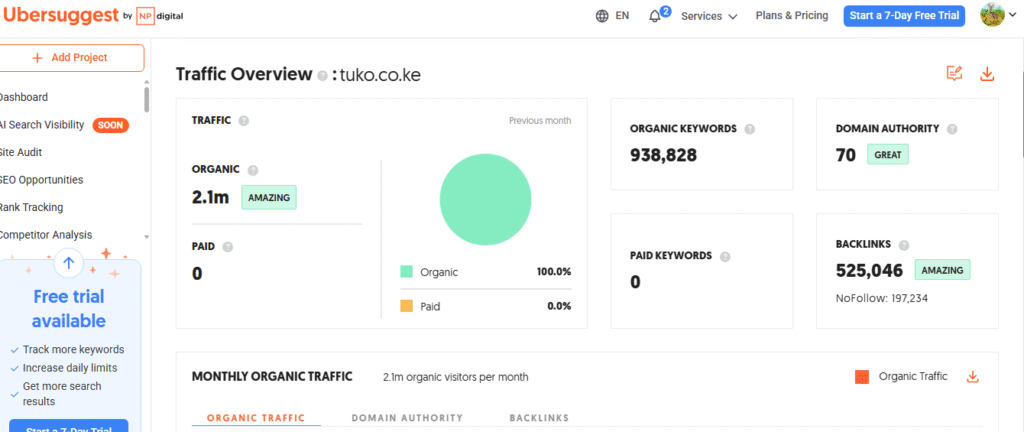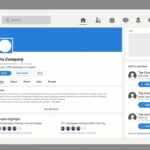I started blogging around 2020, when COVID-19 became a menace for our country, Kenya, and the world. One thing I have noted with my few years of experience is that the blogging scene is always evolving, and it’s not the same as it was five years ago when I was just getting started.
With the various large language models (LLMs) from ChatGPT, Google Gemini, and many others, content creation nowadays doesn’t require the same level of planning as before. With the help of these tools, you can have your final article within minutes. By the way, when I was getting started with blogging, I was two years into college, which was the same time when Online writing in Kenya used to be a thing, and people were earning big from this particular niche. Starting a blog website for me at the time was just a way of trying to avoid the over-saturated idea of competing with Kenyans on freelance platforms as I was bidding for jobs with passion.
The journey to blogging has been fair enough for me with its ups and downs, but it has also helped me connect with many like-minded people in the industry. I have also met aspiring bloggers who want to get started, but often, they are faced with the obstacle of whether blogging is truly profitable or not.
As a matter of fact, if you have time and take a look at Google search trends in Kenya for the term “Blogging in Kenya,” the statistics can be a bit heart-wrenching as blogging was at its peak level from around 2016 to 2022, but then it is still promising even in 2025.

But hey, enough with the numbers? Is it the right time to start blogging in Kenya in 2025? Yes… why? You see, the digital landscape is evolving daily, making it easier for everyone to get started with content creation than ever. Also, now that everyone in Kenya can own smartphones and Internet penetration is at its peak, the odds are in your favor that your blogs will likely be consumed so long as you have the right audience.
Is Blogging Still Profitable in Kenya?
In any business, when it comes to the question of profitability, it is at the top of the mind for many entrepreneurs. By the way, the only way to thrive in the blogging space is if you stop treating it as a side hustle but as your own self-employed business.
Whether a blog is profitable or not really depends on your input to be able to see results. Most bloggers in Kenya earn through the Google AdSense program, whereby a blogger’s revenue is mostly influenced by RPM (revenue per thousand impressions) – revenue an ad publisher generates for 1000 ad impressions and CPM (cost per thousand impressions) – the cost an advertiser pays for every 1,000 ad impressions.
To earn well from AdSense, you also need to build high traffic, but if you are smart enough, in the years I have been writing, I’ll tell you that higher traffic does not necessarily equate to high earnings. Even with smaller traffic, you can still capitalize on it to earn more by exploring other sources of revenue, such as affiliate marketing, brand deals, sponsorship, and more.
Current Earning Potential for Kenyan Bloggers
Based on recent industry data from 2025, successful Kenyan bloggers like Jackson Biko and Robert Alai can make a full-time living from blogging, earning over KES 100,000 per month. Other established bloggers supplement their income by generating between KES 10,000 to KES 50,000 monthly, while newcomers can still earn a few thousand shillings once they build a dedicated audience.
The best part is that, according to recent economic projections, Kenya’s GDP is expected to maintain steady growth in 2025. This economic stability translates to increased advertising spending, which can boost AdSense revenue for creators. A stronger economy for the country means businesses have more budget for digital advertising, directly benefiting content creators.
So, to conclude on whether blogging is truly profitable in Kenya, yes, it is, so long as you are in for the right reasons. For the few years I have been in this space, I have seen many blogs come and go simply because someone wants overnight success. I’ll tell you, it took me 2 years to earn good revenue from my first blog website, and for me, it took that long simply because, at the time, I was so naive, and I had no one to guide me. Blogging in Kenya is very profitable for those who wait and work on their passion instead of viewing it as a get-rich-quick scheme.
Challenges You Will Likely Face
While turning a blank page into ideas daily can offer so many exciting opportunities, I don’t mean to dishearten you. The bitter truth is that you must be prepared to face challenges along the way, especially if you are a newbie.
One of the first challenges you will likely face is competition from other bloggers and content saturation in general. When you search right now for blogs in Kenya, the ranking article is from the FeedSpot website, which lists over 60 best blogs, but this is just the tip of the iceberg as the Bloggers Association of Kenya (BAKE) estimates over 1000 active blogs to be in Kenya as of 2025. So long as there is competition, you will always strive to do better, so take it as a positive thing and work on creating your brand to be unique from the rest.
In addition, covering topics such as education (e.g., “TSC”), finance (e.g., “loan apps, M-Pesa charges”), and more, plus topics in how-to articles such as “paying KPLC tokens via M-Pesa” have now become common across many blogs and websites, making it harder for new websites to rank for such keywords. Today, search engines like Google favor websites that publish unique content that doesn’t exist on the web or add genuine value. If you are getting started, you may want to avoid such topics and focus on what is unique to your audience.
The AI Content Challenge
There is also an issue with monetization that has become more pronounced in 2025. In the past, Google made it relatively easy for bloggers to get approved by AdSense, but this is not the case today. With people now using ChatGPT and other AI tools to generate content, most websites are producing low-quality chunks of content, which has forced AdSense to focus on approving content that genuinely helps people, not content designed for search engine crawling robots.
Google now prioritizes content that demonstrates E-E-A-T (Experience, Expertise, Authority, Trustworthiness). This means your content must show real experience, demonstrate subject matter expertise, build authority in your niche, and maintain trustworthiness with your audience.
Finally, even with the Bloggers Association of Kenya in place, it’s sad for me to mention this, but in Kenya, to be honest, we don’t have a strong blogging community that focuses on helping other bloggers in the industry. New blogs take time to rank on page one of Google as Google trusts platforms with sufficient authority or backlinks. Personally, I have been a victim. Most bloggers try to compete with you directly or even copy and publish your content.
How to Make Sure Your Blogging Becomes Profitable
Being a small and independent publisher in Kenya is not a bed of roses, especially with the occasional Google algorithmic changes, which now favor large publishers, and the fierce competition from large websites that want to cover the topics you are covering. For this reason, to succeed in blogging in Kenya, you need strategies that put you one step ahead. Here are the essential things that you must consider:
Select Your Niche Wisely
Don’t make the mistake of just blogging to hit the publishing button on a daily basis. Before you launch a website, after choosing your domain name, you have to focus, and it is important to select the right niche or specific area of focus where you believe that you are an expert.
When you launch your brand-new website, your domain authority will likely be zero or even below 10 in your first months of blogging. So when you get started by going for broad topics in finance, education, politics, etc., it will be hard to outrank already established websites like Tuko.co.ke, Nation Africa, and Business Daily with authority scores above 70.
If I were launching a new blog today, I would instead focus on hyper-specific areas like Tech Innovations in Kenyan Agriculture, Kenyan Literature and Book Reviews, Urban Gardening in Nairobi, sustainable fashion in East Africa, or fintech solutions for rural Kenya.
When selecting your niche, follow these research steps that successful Kenyan bloggers use:
First, brainstorm broad topics you’re passionate about and have knowledge in. Then use keyword research tools like Ubersuggest or Google Keyword Planner to find related keywords and search volumes. Next, analyze the competition for each keyword, looking for low-competition long-tail keywords where you can realistically rank. Finally, evaluate the commercial opportunities within each niche, including affiliate programs, potential for brand partnerships, and possibilities for creating your own products or services.
SEO and Content Optimization
Unless you are blogging purely for passion, you may want to ignore these steps, but if you are blogging to see revenue growth from your digital work, understanding Search Engine Optimization (SEO) is crucial. There are many types of SEO you need to understand, from on-page SEO, off-page SEO, technical SEO, and local SEO, which will make your articles easier to rank. When your website performs well, your revenue also grows.
You may also want to know about Keyword Research and SEO Analysis Tools such as Keyword Tool IO or Ubersuggest, which can help you find long-tail keywords to rank for and provide you with the necessary data to grow your website from zero to profitable easily.
My best SEO tool is Ubersuggest because it is an affordable all-in-one SEO tool that allows you to conduct keyword research, backlink analysis, site audits, and content ideas generation.

Content Quality Standards for 2025
The content landscape has evolved significantly. Your posts should be detailed and thorough, ideally 2000+ words for comprehensive topics. Focus on providing actionable tips and insights rather than surface-level information. Answer specific questions your target audience may have about the topic, and ensure your content demonstrates real experience and expertise.
Structure your posts properly with H2 tags for main topics and H3 tags for subtopics. Format content well with lists, bold text, and headers to improve readability. Include relevant images and graphics with optimized file names and alt text for better SEO performance.
Monetization Diversification
Don’t become overly dependent on AdSense as your only revenue-generating means. It is risky and will lead to frustration, which you can avoid by exploring other revenue streams.
To earn well from AdSense in Kenya, you need a high number of visitors, but even with low traffic, if you focus on growing your email list and building relationships with your audience, you can earn more than what AdSense pays.
Other revenue sources that have worked for me, and you should try them, include sponsored posts and brand deals, but these two work well if you are already a trustworthy brand in the industry. Consider these additional monetization options:
- Affiliate Marketing: Promote products and services relevant to your niche. When readers buy through your links, you earn commissions. Focus on high-quality products that genuinely help your audience.
- Digital Products: Create and sell ebooks, online courses, templates, or guides related to your expertise. Kenyan audiences increasingly value locally-created digital content.
- Consulting Services: Offer your expertise as a consultant in your niche area. This could include one-on-one consultations, strategy sessions, or ongoing advisory services.
- Email Newsletter Monetization: Build an email list and monetize it through premium newsletter subscriptions or exclusive content for subscribers.
- Community Building: Create paid membership communities or forums where people pay for access to exclusive content and networking opportunities.
The Future of Blogging in Kenya
I am sorry to say this, but if you start a blog in 2025 with the goal of making money within your first six months, then you should reconsider your timeline and focus on other approaches. The truth is that blogging has developed over time and is mainly driven by the technological shifts that are happening right now, not only in the country but on the global stage. To put yourself one step ahead in the game, here are key trends that you should watch out for.
AI and Automation
Personally, it takes me about 4 to 5 hours to write a long blog post and an hour to write a short one, but with the emergence of generative AI tools such as ChatGPT, Gemini, Claude, etc., it has now become possible to generate article drafts in less than 5 minutes. I don’t advocate completely relying on these tools when it comes to writing, but since they are here to stay with us, the better you adapt to using them for content creation assistance, the more you will be one step ahead.

The only problem with using generative tools is that they often produce content that lacks the personal experience and unique insights that readers value. Such content is often generic and doesn’t add real value to your audience and search rankings. Search engines now favor content that demonstrates E-E-A-T (Experience, Expertise, Authority, Trustworthiness).
I tend to use AI models best for research assistance and to generate outlines, but when it comes to actual writing, I rely on my own knowledge and what I have gathered from the research process. This approach ensures my content maintains authenticity while benefiting from AI efficiency.
Platform Diversification
At the end of the day, as a writer, it is not just about creating content using various CMS platforms such as WordPress or Blogger, but also about adapting as quickly as possible to the changing digital landscape. When you hit the publishing button, it is wise to utilize other platforms today, such as X (formerly Twitter), TikTok, and YouTube, to promote your blog and reach wider audiences.
Also, when it comes to acquiring traffic in the long run, you can choose to build your audience either through running paid ads from platforms such as Meta or Google ads, and at the same time, you can also choose to utilize free publishing platforms such as Medium and Substack to grow your blog’s reach and establish authority in your niche.
Successful Kenyan bloggers in 2025 are those who understand that their blog is just one piece of a larger content ecosystem. Consider repurposing your blog content across different platforms: turn blog posts into Twitter threads, create short videos for TikTok explaining key concepts, or develop podcast episodes discussing your blog topics in more detail.
Cross-platform promotion not only increases your reach but also helps you connect with different types of audiences who prefer consuming content in various formats.
Frequently Asked Questions
How much money can new bloggers realistically expect to earn in Kenya?
As a new blogger, you should expect minimal earnings in your first 6-12 months while building your audience. After establishing consistent traffic and authority, earnings can range from KES 5,000-15,000 monthly, with potential to grow significantly as your blog matures.
What are the most profitable blog niches in Kenya for 2025?
Based on current market trends, profitable niches include personal finance and investment advice, technology reviews and tutorials, health and wellness, sustainable living, and specialized education content. The key is choosing a niche you’re genuinely knowledgeable about.
Is it still worth starting a blog in Kenya with so much competition?
Yes, but success requires a strategic approach. Focus on hyper-specific niches, create genuinely helpful content based on your unique experience, and be prepared for a long-term commitment of at least 2-3 years before seeing significant returns.
Conclusion
If you want to be a doubting Thomas and believe that blogging is truly dead, then I really hope that you continue doing so. This will give the rest of us a chance to thrive with less competition. But again, I don’t wish such a thing on anyone, as the blogging space is large enough to accommodate us all. If you want blogging to be profitable, don’t do it for quick money. Do it to build an audience and provide genuine value, and they will help you convert better over time.
The key to successful blogging in Kenya in 2025 lies in understanding that the landscape has matured. Success requires more strategic thinking, longer-term commitment, and a focus on providing real value rather than just producing content. The opportunities are still there for those willing to approach blogging as a serious business venture rather than a get-rich-quick scheme.
If you need help with anything or want to share your own blogging experiences, please let us know in the comments section. The blogging community grows stronger when we support each other’s growth and success.












